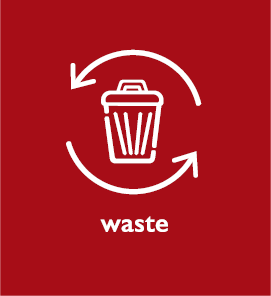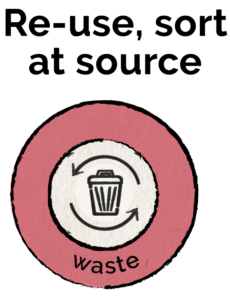Facilities Management
Environmental sustainability at Stellenbosch University

Our aim:
As Stellenbosch’s landfill site is closed, the University has committed to actively manage and reduce the amount of waste generated over the next five years in collaboration with local businesses and municipalities. SU aims to divert waste generated away from landfill through prevention, reduction, reuse, recycling, beneficiation, and responsible disposal. This contributes to SU’s journey of zero-waste to landfill.
Projects & programmes

Centralised Materials Recovery Facility on campus
A centralized Materials Recovery Facility has been established at the Stellenbosch campus to sort 100% of the waste produced on campus, which diverts 75% of waste away from landfill. This facility handles 100 000 kg of waste a month, and this amount has reduced significantly since 2019.

Waste infrastructure (bins and signage)
As part of the Zero Waste to Landfill Strategy, Stellenbosch University has adopted a three-stream general waste system which it encourages members of the campuses to support, using bins and clear signage which make it easy to sort at source.
The Organic and Food waste stream is used for compost. The recyclable material stream contributes to a circular economy and reduces the waste sent to landfill.
A separate e-waste and paper waste stream ensures reduced contamination of these items which are valuable within the recycling market.

Minimisation of waste generated (documentation)
A Zero Waste to Landfill Strategy document was compiled to assist Stellenbosch University to achieve a realistic zero waste to landfill target while implementing required actions. The Waste Management Strategy address waste materials on campus as holistically as possible, from a circular perspective. Implementation of the strategy will help the university in its efforts to address climate change by reducing the university’s carbon footprint.
As part of this strategy, a Standards and Specifications document acts as a guideline indicating which items the vendors and campus community are allowed to bring onto campus. Items need to be either recyclable or compostable. This will enable SU to reduce the amount that is being sent to landfill. These documents form part of the events application ensuring zero waste to landfill events.
What can you do to help:
Reduce this way
Where you cannot avoid using materials in the first place, your secondary responsibility is to get maximum use out of those materials.
- Choose packaging that you can reuse and recycle.
- Use reusable bags and containers.
- Choose products that can be returned, or that are reusable or refillable, above items that can be used only once.
- Avoid individually packed items or snack packets or containers that can be used only once.
- Be aware of double packaging – some “bulk packagings” are merely individually packed items that were repacked and sold as a bulk item.
- Buy items such as dishwashing liquid and washing powder in concentrated form.
- Reduce the amount of unwanted post you receive.
- Buy from second-hand stores.
- Buy items made of recycled material and use and reuse them as many times as you can.
- Use rechargeable batteries, where possible.
- Print on both sides of the paper or, even better, use electronic media.
Reuse this way
If you cannot maximise the use of materials yourself, you should use the infrastructure and facilities provided by others for the recycling of material.
- If you cannot reuse something yourself, give it to someone who can.
- You get your deposit back when you return glass and plastic bottles.
- Reuse your plastic shopping bags and refill your water and milk bottles.
- Give your toilet rolls, egg boxes, and breakfast cereal boxes to local schools for craft projects.
- Donate your old clothes, furniture, toys, and magazines to welfare organisations.
- Repair broken items rather than disposing of them.
- Stellenbosch University has made the following arrangements for the reuse of waste:
- The furniture store makes use of a tender process whereby second-hand furniture can be sold.
- Old paving that is removed, is stored, and used for the repair and maintenance of landscapes or is sold.
- All wood that is removed from campus, is chopped up and reused as ground cover in gardens.
- The water stations on campus encourage the reuse of water bottles.
- Old irrigation fittings that are not broken are reused for the repair of damaged irrigation systems.
- Construction rubble is crushed and reused.
Recycle this way
- Refer to the signage on the three-bin system to assist you in separating your materials at source. This results in sending less to landfill.
- Ensure that your recyclable item is free from liquids, sauces, or food residue. This reduces the contamination of clean, dry recyclables.
Contact the Service Desk (021 808 4666) for further information or send an e-mail to groen_green@sun.ac.za.
